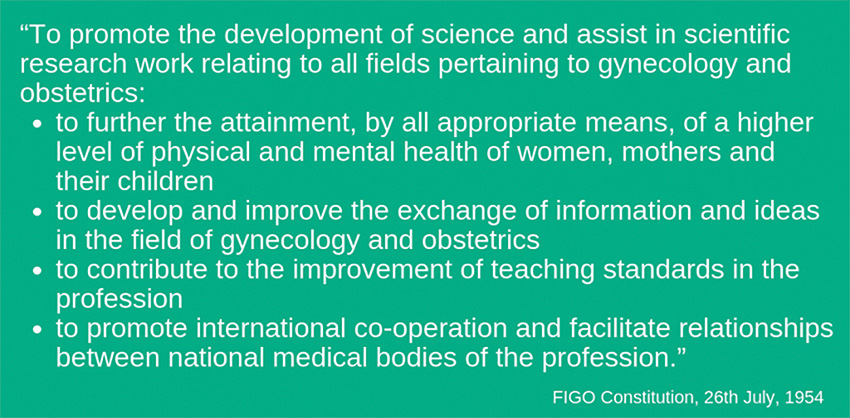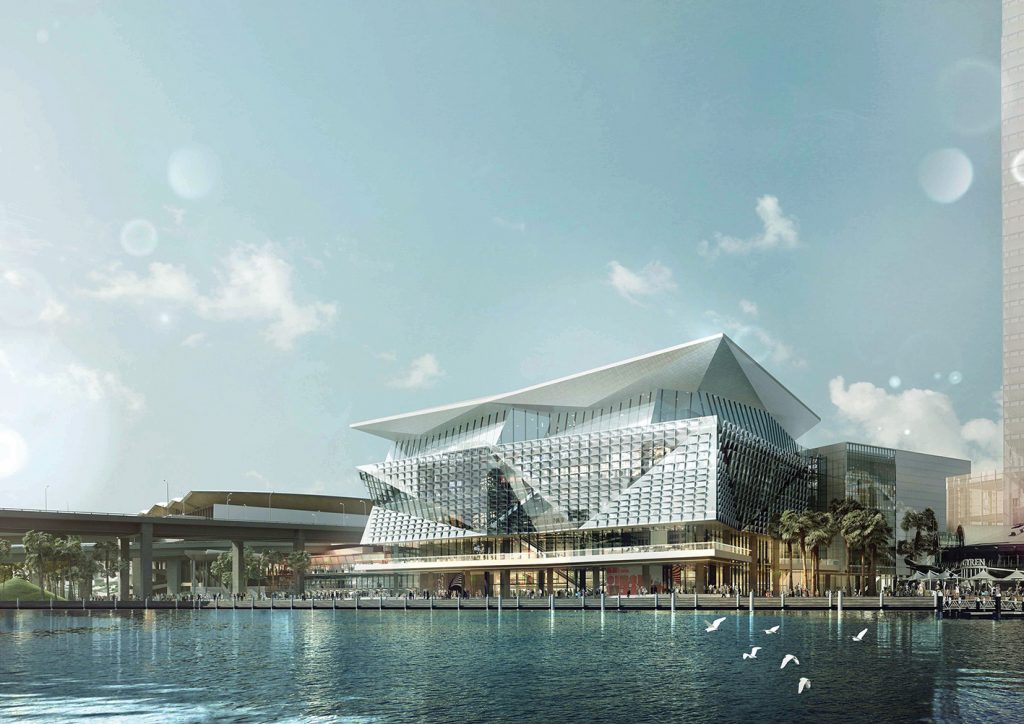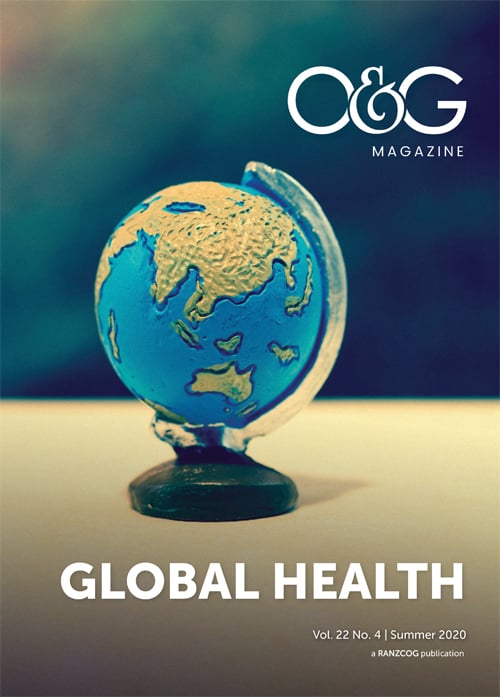Every three years, FIGO – the Fédération Internationale de Gynécologie et d’Obstétrique – holds its global meeting. In October of 2021, that meeting will be hosted in Sydney by our College. That is quite a responsibility and an incredible opportunity to put Australia, New Zealand, and the Western Pacific in the global spotlight for women’s health. With the COVID-19 pandemic it is also a major challenge.
FIGO has a global focus, aiming to promote and develop and share the science underpinning advances in the physical and mental health of women across the world. Its vision (Figure 1), adopted in the 1950s, remains the same to this day. The FIGO organisation was the brainchild of a Swiss O&G, Hubert de Watteville, who drew together 42 international societies in 1954. Today, that group of societies and colleges has grown to 132, all committed to ‘ensuring that women of the world to achieve the highest possible standards of physical, mental, reproductive and sexual health and wellbeing throughout their lives.’

Wherever you are in the world, you can be part of FIGO 2021.
The path to where we are
The fifth FIGO congress was held in Sydney back in 1967, more than a half-century ago and a dozen years before our local Australian and New Zealand Colleges existed – at the time we were a Council of the RCOG. The most recent congress, held in Rio de Janeiro in 2018, attracted over 11000 delegates. It is difficult to convey adequately the experience of meeting, speaking, building networks, teaching and learning with people committed to women’s health from all points of the world. In many respects the wealth of enthusiasm, knowledge, and passion for women’s issues is almost overwhelming – there are so many events and speakers that it can be difficult to choose.
Our College bid to become host of FIGO 2021 was a process lasting several years and led by some of the most senior Fellows in the country. Our bid was supported by Business Events Sydney and the NSW Government, who provided financial and other support, and shared the vision of a uniquely South Western Pacific event. The final vote was held during the FIGO Congress in Vancouver in late 2015. It was an exciting process and I spent much of that meeting walking around with an Australian expatriate who wore a koala suit and posed for selfies with delegates. The hot and sweaty koala suit had tiny eyeholes and afforded poor vision, so I had to guide him as he navigated the trade display hall by holding his hand. Spending several days in Canada, strolling hand-in-hand with a giant koala, was quite an experience.
Once our College had won the bid, it became clear just how daunting a task we faced in running such a massive meeting. The only meeting that had come close to the anticipated size of FIGO 2021 was our joint meeting with the RCOG held in Brisbane in April of 2015, attracting over 2000 delegates. That meeting had been a major success, but for the FIGO Sydney meeting, we had to plan for as many as four times that number of delegates.
At the time of our bid, the old Sydney Convention Centre had been demolished for more than a year to make way for the new facility – the $1.5 billion International Convention Centre. We had no physical facility to show anyone at the time, although the virtual tour was impressive. The new centre, located on the footprint of the old building on Darling Harbour, is one of the most incredible conference locations on the planet. With cutting edge technology, impressive spaces and facilities, and staggering views and accommodation on site, the venue for FIGO 2021 could not be better.

Figure 1. The FIGO Constitution, adopted in the 1950s, remains the same to this day.
Giving life to the global voice
A FIGO world congress is a breathtaking event in scale and vision: it is as much a cultural event as it is a scientific and biomedical conference. The many languages, customs, and the different focus of so many participants are exciting but, at the same time, can be overwhelming. One thing that Australians and New Zealanders excel at, though, is welcoming travellers and making friends. I think this is one of the reasons there is so much excitement about the meeting being held in Sydney. College Fellows, diplomates, and trainees at all levels will be sought out as friends and have the chance to build enduring global partnerships.
One of the key responsibilities of our local committee is to deliver the ‘Fellowships program.’ The program is a highlight of any FIGO congress and aims to bring up to 30 emerging leaders in women’s health research and practice from developing countries to hospitals and research centres across Australia and New Zealand in the lead-up to the FIGO 2021. The program is fully funded by the Australian Government through the Department of Foreign Affairs and Trade, for which we are extremely grateful. International participants will stay, and likely form long-term mentorship and collaborative bonds, with College members. They will visit and observe activities, learn and teach, then return to their homes. FIGO Fellowship participants commonly go on to take global leadership roles in women’s health.
For College members less familiar with FIGO, it is a common misconception that FIGO activities are solely aimed at low- and middle-income countries. Improving women’s lives in areas where problems such as fistula and cervical cancer are common are vital for obvious reasons. The lives of millions of women, and their families, can be made better with concerted but relatively ‘low tech’ actions. Yet FIGO has a much broader focus: cutting edge technologies from genomic analysis to robotic surgery also are on the agenda. More generally, issues important to all of us wherever we live – reproductive rights, intimate partner violence, political empowerment – are grist to the FIGO mill. FIGO congresses encompass such a broad range of issues that few areas of women’s health and wellbeing are not covered in detail.

International Convention Centre Sydney: the venue for FIGO 2021.
Off the page and onto the stage
The local organising committee includes members not only from our College but representatives from nursing and midwifery – the great majority of women’s healthcare globally is provided by nurses and midwives. The Scientific Committee is Chaired by Prof Frank Louwen from Germany, and includes advisors from around the world. The Central Organising Committee is Chaired by Prof Andre Lalonde, based in Montreal. It includes members from both South and North America, Europe, the UK, Australia, and South East Asia. For this reason, arranging Zoom meetings is a considerable challenge taking into account the multiple time zones – for the Australians, these meetings are held close to midnight.
Unsurprisingly, the COVID-19 pandemic has had a major effect on planning and has added a layer of hitherto unimagined complexity to organisational arrangements. Even with the most optimistic outlook on travel ‘bubbles’ and vaccines, it is clear that quarantine times and costs, and the likely effects on cost and availability of international travel, will impose a severe effect on our ability to run an in-person global meeting. However, and as the experience now of a number of other international meetings of similar scale has shown, a hybrid meeting has the potential to open a meeting up beyond any past experience. Hybrid meetings – where in-person attendance is complemented by virtual attendance – are likely to open up a breathtaking level of engagement barely imagined before the pandemic. Instead of 10,000 delegates in one place, it is easy to imagine 100,000 attendees freed from the difficulties of travel and its costs, time zone, and language barriers. The scientific program being built now is looking to maximise the potential of this disruption.
FIGO has a focus on bringing together people from both high- and low-and-middle-income countries to build a global team to advance women’s health. In reality, many potential participants from disadvantaged parts of the world faced great challenges in attending. Pivoting to an hybrid format – part in-person but with a virtual embrace – is likely to make FIGO the truly global voice for women.
Improvements in communications technology have seen a total reinvention of the conference format, with high-quality vision and sound, instant interaction, and development of virtual communities barely thought of a year ago. Fortunately, Australia is seen as a safe destination and for many potential participants who have not been able to travel for extended periods, Sydney is likely to be a very attractive destination. For this reason, with FIGO 2021 still a year away, we are anticipating the congress as being one of the first major international meetings after the onset of the pandemic. The international experience of COVID-19 will mean that technology is brought to bear to maximise the health and safety of participants who attend.
Beyond the usual women’s health issues, this will be the first major conference where research studies of COVID-19 in pregnancy will have mature data, so a major component will concern the pandemic, its outcomes and management. We are anticipating enormous interest in presenting COVID-19 related research and using these data to build a global knowledge base to inform ongoing care and to prepare for the next, inevitable, pandemic.
You can find out more about the Sydney meeting at figo2021.org and members of the local organising committee would welcome the opportunity to speak with you about your meeting. We all are excited about meeting you, welcoming you to FIGO, and joining you at the greatest show on earth for women.






Leave a Reply